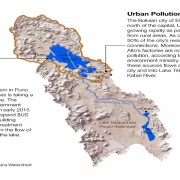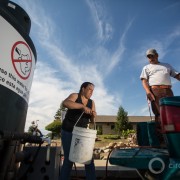Clean, Affordable Water is a Problem in This Country
While almost everyone in the United States has clean, reliable drinking water, some people are left behind. And with the economy as it is and the cost of infrastructure going up, more may struggle in the future.
“Inadequate access to drinking water” is a clinical phrase that appears in official statements and in United Nations documents, where it is assiduously tracked and tallied and summarized in annual progress reports.
I would bet that for many readers it conjures images of beshawled women on dusty dirt roads with yellow jerry cans sprouting from their heads. Yet as the new book Days of Destruction, Days of Revolt makes poignantly clear, inadequate access is a problem right here, in this country, the United States, the richest in the world.
Can You Spare a Drink?
Days of Destruction is a joint effort between Pulitzer Prize-winning journalist Chris Hedges and graphic artist and journalist Joe Sacco. They set out to give voice to people living in what they call America’s “sacrifice zones”—Pine Ridge Indian Reservation in South Dakota; Camden, New Jersey; Appalachian coal country—places where capitalism or government has taken much but returned little.
Among a numbing list of ills, water jumps out. More than sixty percent of the homes on Pine Ridge lack running water. In southern West Virginia, where mountaintop mining has ruined valleys, streams and lives, Maria Gunnoe tells the two writers that she does not drink the area’s water:
“All the water I consume, including tea and coffee, is bottled. I spend about $250 a month on bottled water. The West Virginia Water Company wants $46,000 to put water in to me, even though it is only five hundred feet of water line. I can’t afford that…My well is contaminated. And those who do drink the water get very sick, usually pancreatic cancer, liver disease, gallstones, or digestive tract problems. Our newest building in town is a kidney dialysis unit.” –Maria Gunnoe
Stories like these can be found across the United States. While on a reporting trip last fall in New Mexico and Colorado, I spoke with a Navajo family who had no running water. They traveled a half mile to Grandmother’s house to take showers.
In Detroit, the water department cut off more than 42,000 homes from the water system in 2005 because they could not afford to pay.
Other appalling circumstances in the U.S. were laid bare in a 2011 report from a United Nations-appointed expert on water and sanitation. Portuguese lawyer Catarina de Albuquerque wrote that citizens on the margins—the poor, the homeless, and many Native American tribes—pay proportionately more for lower-quality water.
Water and sewer bills continue to rise faster than inflation. After years of under-investment, many systems need the cash for repairs, but there’s also a flip side. I’ll have a story up soon about what local water officials are telling Congress about mandated improvements to water infrastructure. In short: they are taking up a significant portion of local budgets, and more residents are struggling with the bills.
Poverty—almost anywhere—and water insecurity walk the rough road hand-in-hand. It’s an important story, and one that we’re keeping an eye on.
Do you struggle for drinking water or know someone who does? Contact Brett Walton
Brett Walton
Circle of Blue reporter
Brett writes about agriculture, energy, infrastructure, and the politics and economics of water in the United States. He also writes the Federal Water Tap, Circle of Blue’s weekly digest of U.S. government water news. He is the winner of two Society of Environmental Journalists reporting awards, one of the top honors in American environmental journalism: first place for explanatory reporting for a series on septic system pollution in the United States(2016) and third place for beat reporting in a small market (2014). He received the Sierra Club’s Distinguished Service Award in 2018. Brett lives in Seattle, where he hikes the mountains and bakes pies. Contact Brett Walton







Leave a Reply
Want to join the discussion?Feel free to contribute!